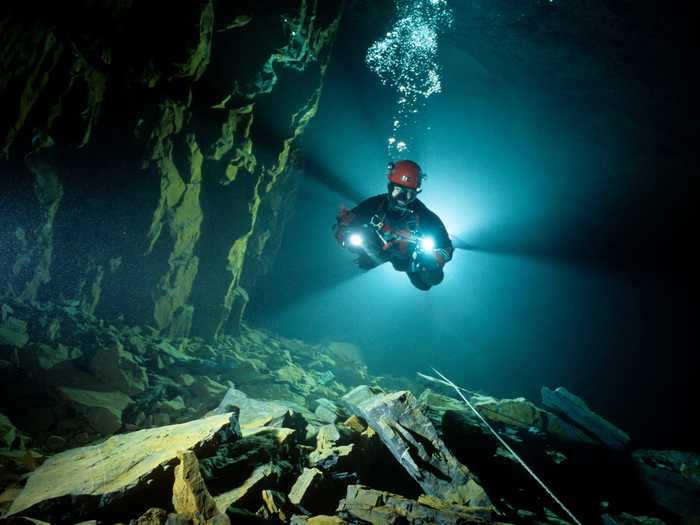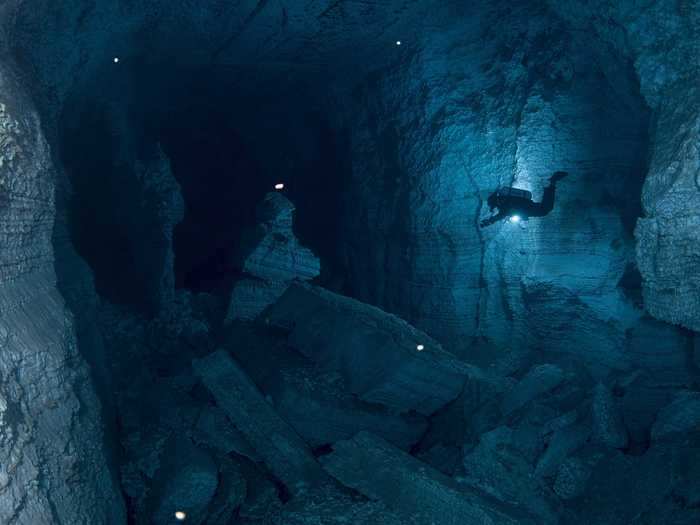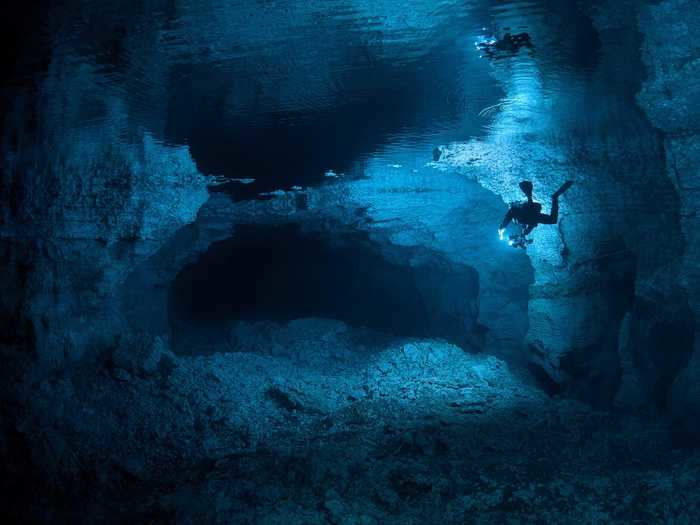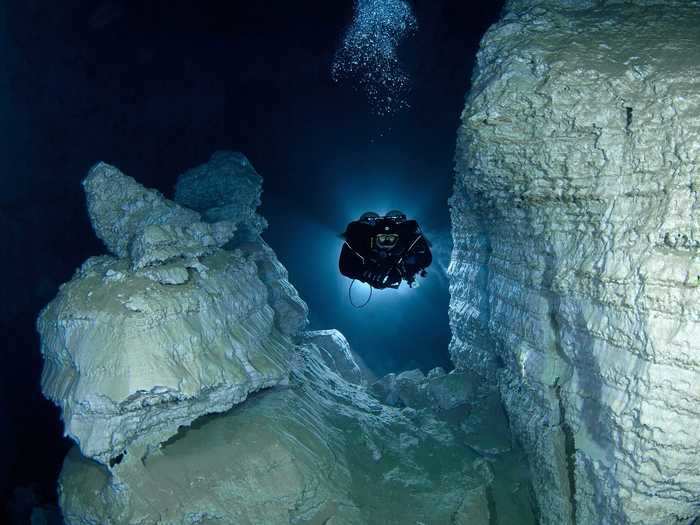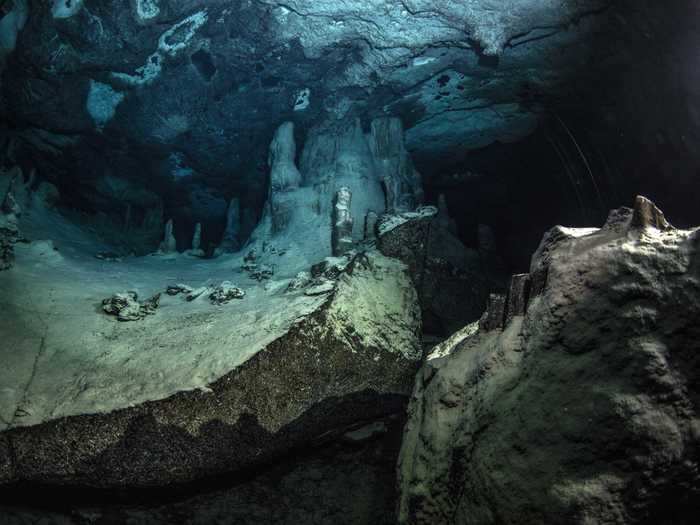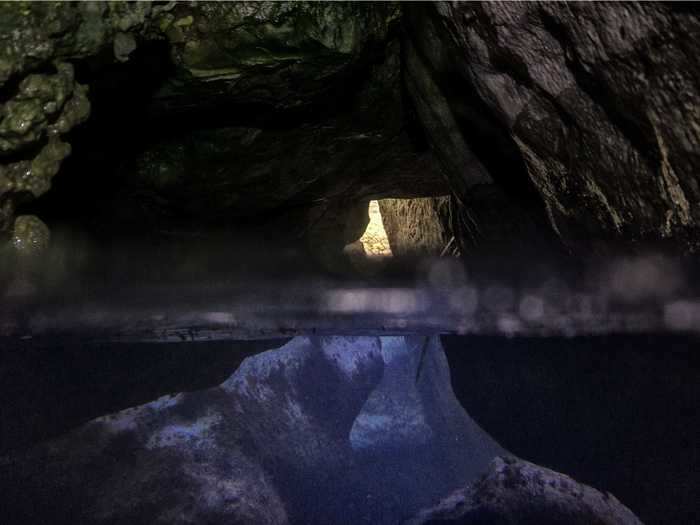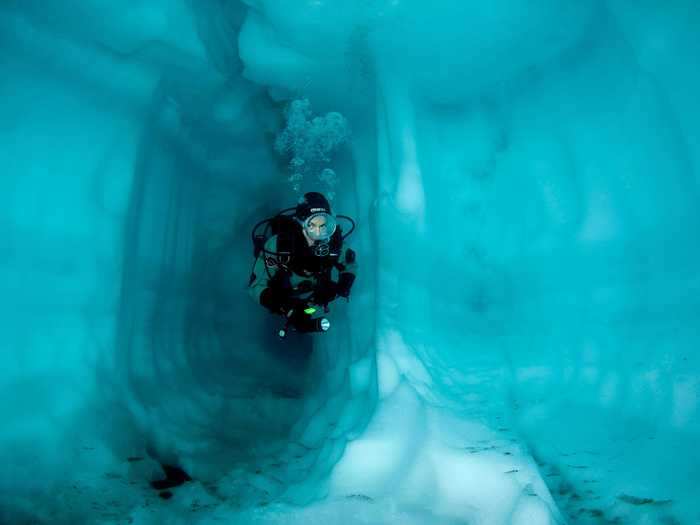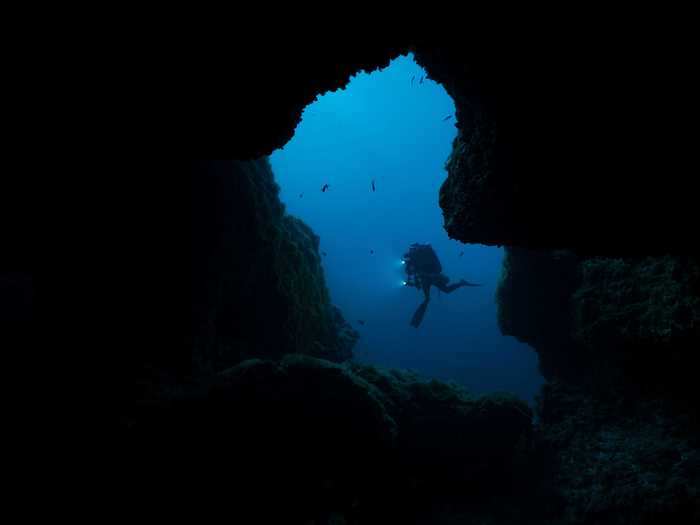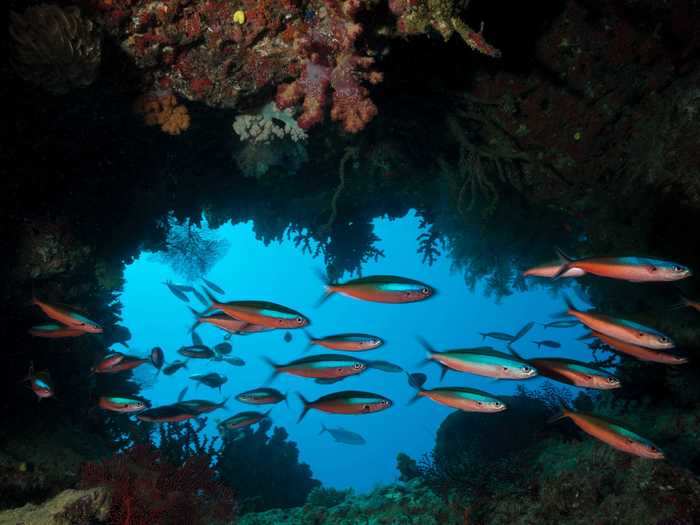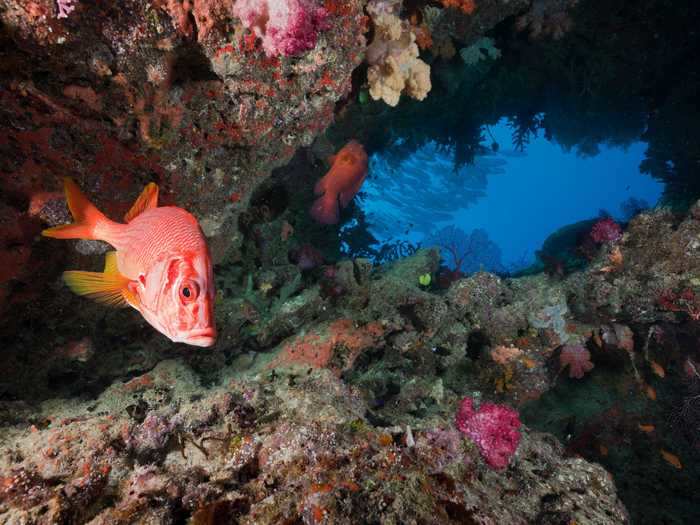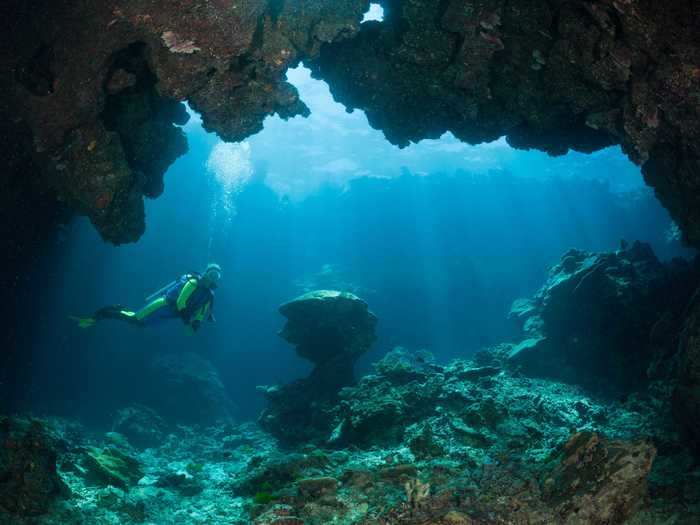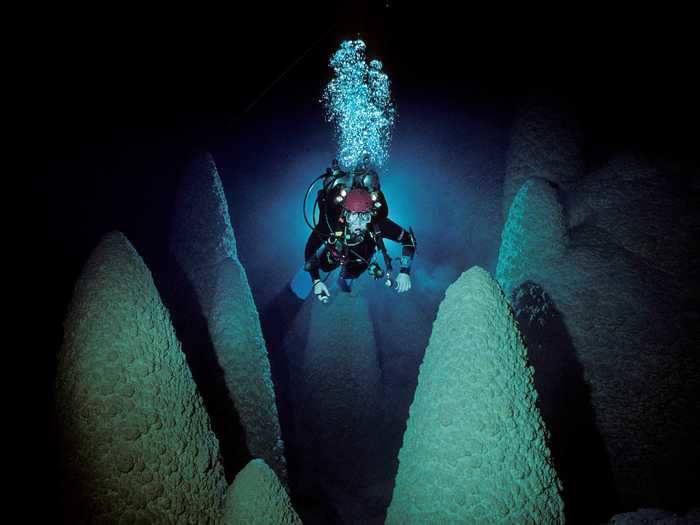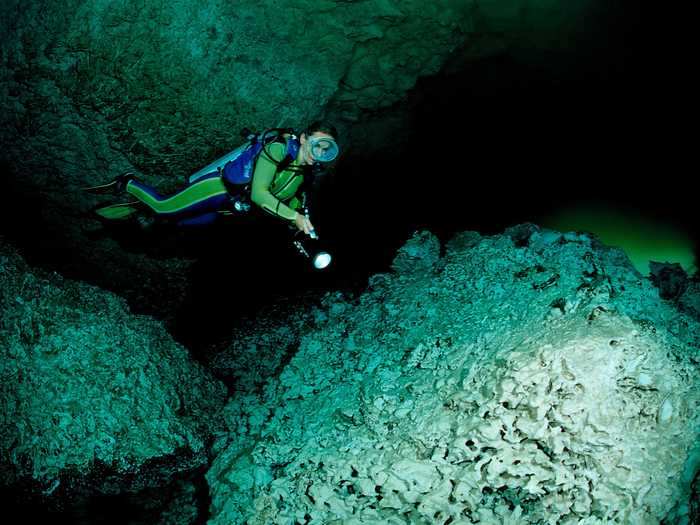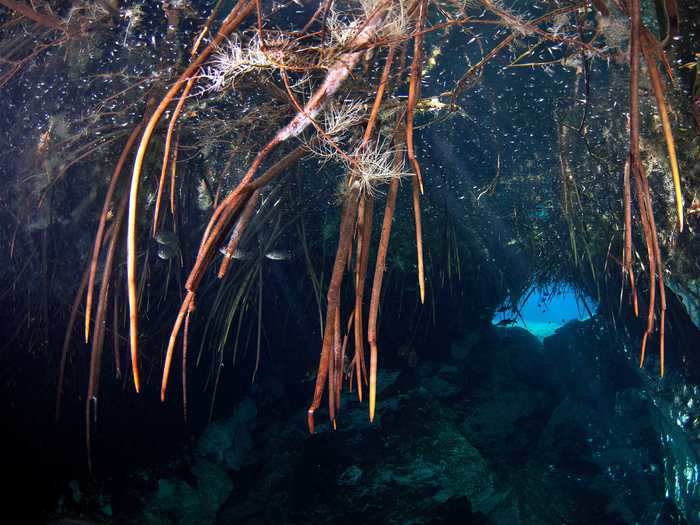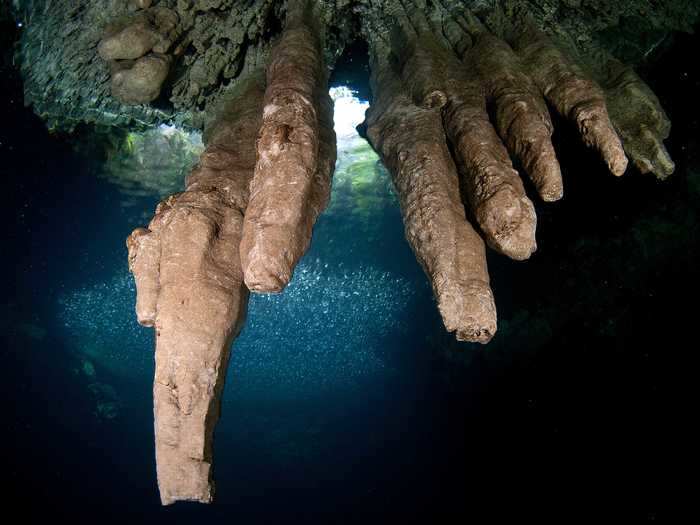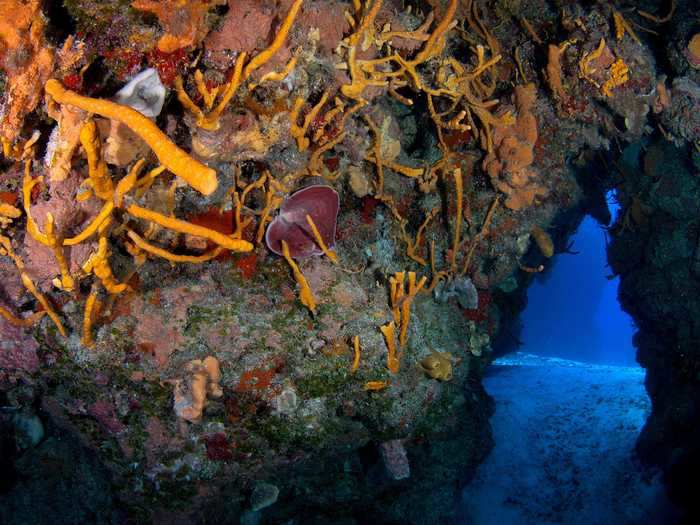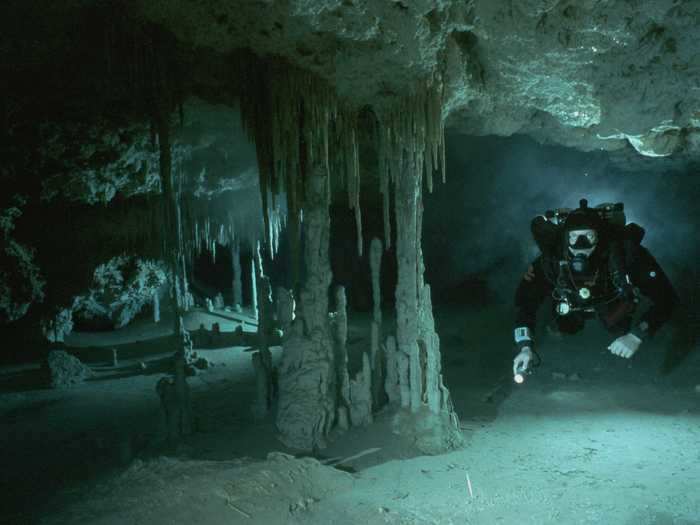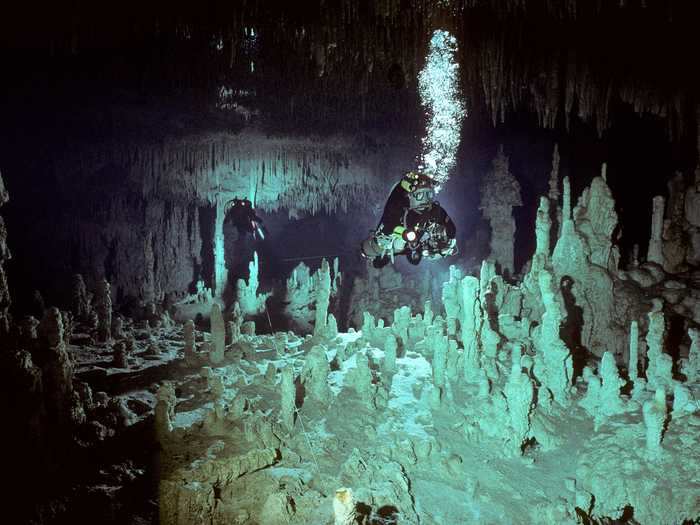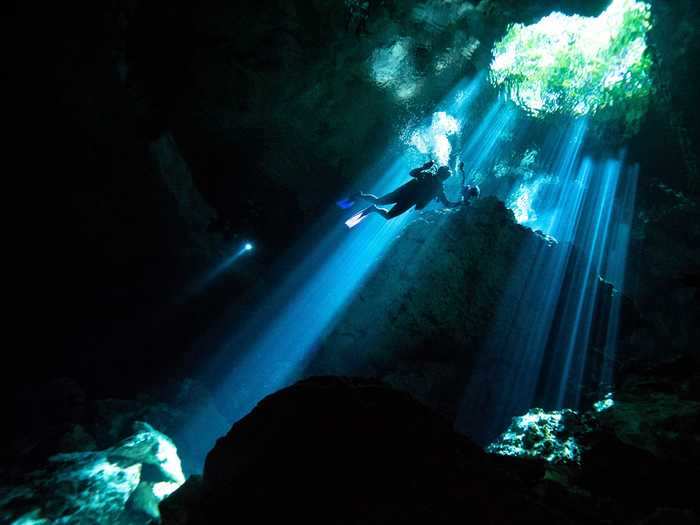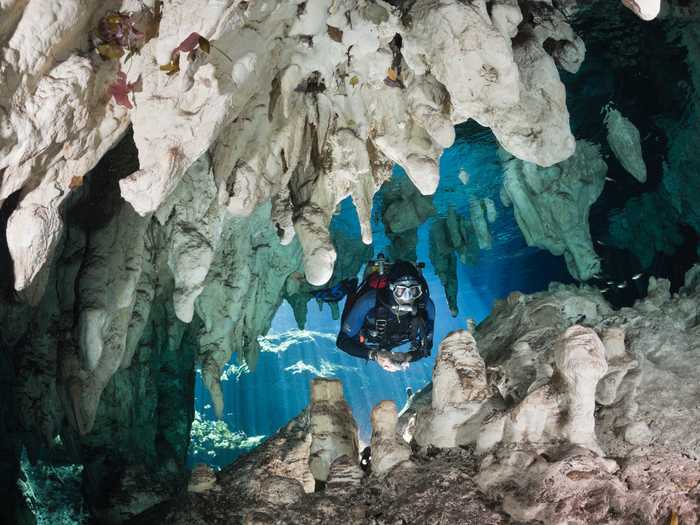An underwater cave in Mexico, left, and an ice cave in Switzerland.Donald Miralle/Franco Banfi: Barcroft Media/Getty Images
- From tropical pools in Mexico to icy waters in Russia, underwater caves can be found around the world.
- Divers and underwater photographers have made it possible to see these mysterious places of beauty.
- Visit Insider's homepage for more stories.
Underwater caves can be found around the world, but appear and develop differently according to their environment. Caves in warmer waters can be home to coral reefs, while ice caves have less abundant life.
Photographers and divers have made it possible for us to get a glimpse at these mysterious underwater worlds. Images taken across the world, from Mexico's cenotes to Russia's underwater mineral caves, reveal beauty at great depths.
Take a look at photos of underwater caves around the world.
Read the original article on
Insider
In Neath Valley, South Wales, the Dinas Rock Silica Mine is also home to mysterious underwater caves.
Neath Valley, South Wales.
Martyn Farr : Barcroft Media/Getty Images
The rocks in the Dinas caves are almost 100% silica, which made them a target for miners from the 18th to the 20th century.
The Orda Cave is the world's only underwater gypsum excursion cave. Gypsum is a mineral that keeps the water very clear.
Russia's western Urals region.
Victor Lyagushk : Barcroft Media : Getty Images
The cave is also a member of ISCA (Association of Excursion Caves of the World).
The divers took the stunning photos of the Orda Cave to bring light to the importance of its preservation.
Ural, Russia.
Victor Lyagushk : Barcroft Media/Getty Images
The divers applied for the cave to become a UNESCO World Heritage Site in 2008, but the site is yet to be confirmed on their list.
Cave divers from the Orda Cave Awareness Project explore the beautifully transparent Orda Cave in Russia's western Urals region.
Ural, Russia.
Victor Lyagushk : Barcroft Media/Getty Images
The Orda Cave is the longest underwater cave in Russia, and the second longest in Eurasia.
An underwater cave with "fairy chimneys" is seen in Hatay, Turkey.
Hatay, Turkey.
Sebnem Coskun:Anadolu Agency/Getty Images
According to Smithsonian, "fairy chimneys" were formed millions of years ago by volcanic ash. When the ash hardened, it became tough, porous rock.
This photo of a cave near the cliff of Cap Canaille in Cassis, southern France, shows the cave from above and below the water's surface.
Cassis, France.
Boris Horvat: AFP/Getty Images
According to the Michelin Travel Guide, Cap Canaille is named for its waters. "Canaille" comes from the Latin Canalis mons, "the mountain of the waters," which refers to the aqueducts built by the Romans to channel its fresh water.
A scuba diver swims through an ice cave in Lake Sassolo in Sambuco Valley, Ticino, Switzerland.
Ticino, Switzerland.
Franco Banfi: Barcroft Media/Getty Images
Though Lake Sassolo is close to the Italian border, its proximity to the Alps keeps its waters cool, allowing such magical ice caves to form.
Europe's waters are also home to submarine caves. This scuba diver enters an underwater cave in the Mediterranean Sea, off the coast of Marseille, France.
Marseille, France.
Alexis Rosenfeld:Getty Images
Though the Mediterranean has only 1% of the world's oceans and seas, it is home to nearly 10% of the world's marine species.
A shoal of neon fusilier fish swim by in a cave in at the Namena Marine Reserve.
Namena Marine Reserve, Fiji.
Reinhard Dirscherl: Ullstein Bild/Getty Images
The reserve is home to more than 1,000 species of invertebrates, 400 known corals, 445 documented marine plants, and over 1,100 fish species.
Squirrelfish are residents of underwater caves at the Namena Marine Reserve in Fiji.
Namena Marine Reserve, Fiji.
Reinhard Dirscherl: Ullstein Bild/Getty Images
According to Britannica, Squirrelfish, also called soldierfish, refer to any of about 70 species of large-eyed, colorful, tropical reef fish.
Another location for tropical underwater caves is Fiji. This scuba diver explored this one in Fiji's Namena Marine Reserve.
Namena Marine Reserve, Fiji.
Reinhard Dirscherl: Ullstein Bild/Getty Images
According to its website, the Namena Marine Reserve was established in 1997 and is approximately 70 square kilometers (27 square miles). It surrounds the tiny island of Namenalala, and stretches between the two main Fijian islands of Viti Levu and Vanua Levu.
The Mimoso Cave in Mato Grosso du Sul, Brazil, is full of mysterious cone-like underwater formations.
Mato Grosso du Sul, Brazil.
Martyn Farr:Barcroft Media/Getty Images
Mato Grosso do Sul is one of the main ecotourism and adventure tourism destinations in Brazil.
A scuba diver exploring an underwater cave in Laguna Pepe, Punta Cana, in the Dominican Republic.
Punta Cana, Dominican Republic.
Reinhard Dirscherl: Ullstein Bild/Getty Images
Mangrove roots hang from the ceiling of a cave in Casa Cenote near Tulum, Mexico.
Tulum, Mexico.
Luis Javier Sandoval:VW Pics:Universal Images Group/Getty Images
Casa Cenote is known for its series of underwater caves and incredibly clear water, allowing snorkelers and divers to easily see its beauty.
The Cenote de Siete Bocas (Cenote of Seven Mouths) is in Puerto Morelos, Riviera Maya, Mexico.
Puerto Morelos, Riviera Maya, Mexico.
Luis Javier Sandoval:VW Pics:Universal Images Group/Getty Images
The seven mouths in the name refer to seven openings that lead to the surface. The rock formations above are stalactites, formed over hundreds of thousands of years.
Vibrant reefs can grow on the walls of underwater caves in tropical waters, like this one in the Caribbean Sea off the island of Cozumel, Mexico.
Caribbean Sea, Mexico.
Luis Javier Sandoval:VW Pics:Universal Images Group/Getty Images
The reef is full of gorgonias, a type of soft coral, and sea sponges.
A diver explores a spooky underwater cave in the Sac Be Ha Cenote in Quintana Roo, Mexico.
Quintana Roo, Mexico.
Martyn Farr : Barcroft Media/Getty Images
In 2018, Robbie Schmittner, pictured, helped forge the underwater link between the two cave systems that created the longest cave diving complex in the world.
The Gran Cenote cave in Mexico is part of the longest underwater cave system in the world.
Gran Cenote, Quintana Roo, Mexico.
Martyn Farr : Barcroft Media/Getty Images
The world's longest cave was discovered in Mexico's Yucatan Peninsula in 2018. The new discovery connected two previously known flooded caves into one 215-mile-long stretch, according to National Geographic.
A diver swims through a sunbeam in the Cenote Taj Mahal in Quintana Roo, Mexico.
Quintana Roo, Mexico.
Donald Miralle: Getty Images for Lumix
Named Taj Mahal for its beauty, it has multiple openings that allow sun to reach its waters.
Mexico has thousands of underwater caves in its cenotes, like this one in Tulum.
Inside a cave in Tulum, Mexico.
Reinhard Dirscherl: Ullstein Bild/Getty Images
Mexico's Yucatán Peninsula holds tens of thousands of cenotes, which are created when the ceiling of a cave collapses.
"An important water source, they were also a mystical threshold between this world and the underworld, marked with sacrifices of pottery, jewelry, and occasionally human beings. Today, many double as swimming spots popular with locals — and often unknown to tourists," according to National Geographic.

